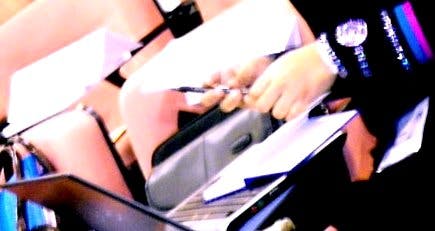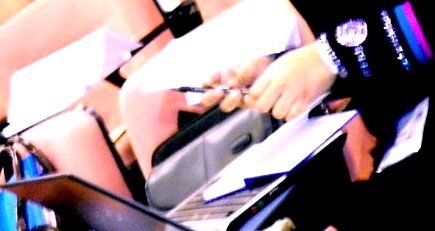Connection and Communities
Jan 21, 2015
Story


I first typed on a typewriter when I was eight. Filled with excitement, I couldn’t sleep at night and typing was the first thing I did in the morning. Three years later I finally had my hands on a computer! Unfortunately, my father had to take back his office computer. It was 2004 when I accessed the internet for the first time, albeit with an exceptionally slow dial-up connection which would only let me perform a few task in a hurried state of mind.
I have been accessing broadband for three and wireless broadband for two years now - this has enriched and completely changed my online experience and usage. However, the quality of service depends on various service providers; connections quality sometimes can be inconsistent. Electricity has never an issue for me, but my mobility affects the way deal with situations like expired internet card or technological complications I cannot repair.
Frustrated by the lack of opportunities for internship of any kind let alone the type I was searching for after graduating from high school – I found my choice of paid internship online, in a completely different country!
The most exciting impact the internet had is on my education, from audio/video lectures to e-books to access to someone in Singapore or South Africa who might have a better or completely different understanding of a certain topic. Access to the vast array of information is amazing; access to people’s wisdom around the world is priceless.
The internet came to Saudi Arabia in 1994; however, it was available only for academic research. It was offered for public and commercial use around 1999 – this took place after the government installed filtering systems. The system filters any sites related to pornography, gambling, religiously offensive content, and dissident political groups. But any sites containing ‘sensitive information’ are also blocked.
Much of the criteria apply to traditional and non-traditional media as well. The recent arrest of Manal Sharif was under the act of ‘inciting public opinion and violating public order’ when she posted her driving video online. In 2009, the government asked cybercafés to provide lists of customers and websites consulted, banned the use of prepaid cards or non-authorized internet satellite links and install hidden cameras. Most women use internet via home computer but there are women without access to home computers and they use via women-only cybercafés or more popular, via cell phones. The growth of web 2.0 tools began around 2005 when we witnessed a favorable attitude towards blogging. As of 2006 -- there were around 2000+ blogs and half of the users were women-- most blogs are in Arabic though, there are many in English as well.
People grew more accustomed to express themselves more vocally online than offline. Some bloggers would write about things they would normally not say in real lives. Despite growing up in a restrictive atmosphere, my parents would always talk openly about politics or other deemed sensitive issues. And that’s why, perhaps, I would talk openly about few issues for which I’m often interpreted as ‘outspoken’. Nonetheless, there are some topics I would refrain from writing online and sometimes re-word myself. For every word I type, I think twice.
From 2000 to 2010, Internet usage in my country has grown 48-fold in 10 years. Q1 Report of 2011 reveals around 11.8 million internet users and the country’s broadband subscriptions stands at 4.88 million. Over the years, the government has dedicated huge resources to provide computers for citizens.
The internet and social media is providing an alternative platform for activism and discussions. More people, women predominantly felt they can further causes and issues important to them via gathering support online – since mobility and access is an issue for many women.
From my observation, online debates eventually slide into your home and sometimes public debates. But time and again, it misses out the context - and conversations can often lack the grace, empathy and
sometimes marred with sarcasm. I really don’t feel debates taking place online is an alternative we can afford in the long run. Ultimately, conversations and debates need interaction in physical space so we can
truly express ourselves and show respect.
Internet Access is vital to empower communities
According to UN’s International Telecom Union (ITU), in 2000 there were 500m mobile and 250m internet users globally. In 2001, these numbers have magnified to over 5b mobile users and 2b internet subscribers.
As more communities are joining the digital world and more communities are waiting to connect– it’s unto each community and individual to decide how they will use the internet to harness the power of each individual of their community for personal growth and social development. Many interpret giving internet access is like ‘dumping technology’ on the poor/underprivileged/marginalized/dis-empowered! I believe internet access is the first step – it’s the people who will and must decide how they would shape its usage, improve community and most fundamentally, have a say in global and local agendas impacting them.
In my city, Fix Jeddah is a new crowd-sourcing platform powered by Ushahidi aims to improve road conditions and city hygiene by enabling citizens to report about garbage accumulation, random speed bumps, poor infrastructure, potholes etc.
The over-flooding of my city in 2009 has been a watershed moment in Saudi internet and social media usage. Frustrated with slow response from authorities, citizens and residents have used their smart phones to capture, share, and document. I have been a part of a project aiming to ‘wiki’ the entire event and impact. The country has a very high number of mobile users (53.3 million mobile subscriptions 2010) and quite a large number use smart-phones.
In early 2011 flooding, the city braced itself again and this time
much more focused, organized and mobilized. We used hash tags to
monitor and broadcast, e.g. #JeddahFlood was initially used to express
anger, frustration, warn and help. Later in the evening, hash tag
JeddahHelp and #JeddahVol was used to exclusively gather volunteers
and broadcast help/need messages. It was a good way to avoid missing
important messages and perhaps an example of how communities can
effectively use hash tags in time of emergency when many express
emotions and SOS messages in the same hash tag, adding to confusion!
Using hash tag proved effective in this case since a particular social
network is used by many locals; otherwise it would not have been
possible.
Although actual physical coordination of large groups was a
challenge - but in terms of receiving messages and helping in small
groups or individually - was very effective. However, I couldn’t help
but notice how many people were spending too much time online and less
on the ground. And also, a 20 minute drive to a close area revealed
people in need who couldn’t access the internet. There were manual
workers and small retailers walking in the same cloths for days, many
not eaten for a day or more. They couldn’t ask for help simply because
they didn’t have internet connection at home or on their mobile
phones. They were at the mercy of people passing on the information.
To improve access and usage in my community, it’s important to educate people about the beneficial usage of internet; the gov. must also allow us to access important information. The cost of using internet via cell phone must also come down. I cannot afford a mobile data package so I use my wireless modem at home to access or any wi-fi hotspots. Most of us know how to click, but how can we click more responsibly and socially actively is the question we can explore further.
Digital Freedom
Personalized results of search engines are a deep concern – do search engines bring me results of content that I prefer to read? As internet connections become more reliable and cheap – we are spending more time online, many developing an addiction or shorter span of attention. And instead of reading and learning more, we may end up reading less.
Digital freedom is a very exciting and evolving term for me – for many it’s synonymous to freedom of expression.
In broader sense, for me it means the right to privacy and protection of my personal data as a consumer/individual online, the right to be educated about my privacy related issues online, the right to access, information and the responsibility of respecting and posting correct information while expressing myself.
But can we expand further? Isn’t it important for our governments, corporations and communities to deal responsibly with e-waste, use environmentally friendly materials to produce laptops and computers and protect worker’s rights who produce them? – Digital freedom shouldn’t be about the users of technology only but also about protecting our environment and workers in forming a digital world.
Increasingly words like social media/network, mobile and internet are used intertwined. In order to operate in any environment, it’s important to know how things work and how can we make it work better. The internet has become more sophisticated, involves more players and potentially involves more risk factors. Children at school should be taught how to use the internet, social media protection online and digital laws. In order to be ‘free digitally’, it’s essential we teach the new generation in a more responsible fashion. Women must be protected from ‘online blackmails’, children must be protected from ‘online bullies’ and communities must be protected from misleading information and rumors. The good news is – the internet has no borders. At the moment - more of us and hopefully, in coming years - all of us can play positive role in nurturing this environment. ---------------------------------------------------------------------------------------------------------------------------------------------------------------------------
In a time when freedom of expression and equal access to knowledge and ideas has become synonymous with access to the Internet, World Pulse is asking women worldwide: What does "Universal Internet Access and Digital Freedom" mean to YOU? This month, we invite you to raise your voice by writing about the everyday obstacles you face and risks you take in accessing the Internet, or how you have used it to change lives and bring about positive change in your community. Click here to learn more about this campaign and how to participate.




